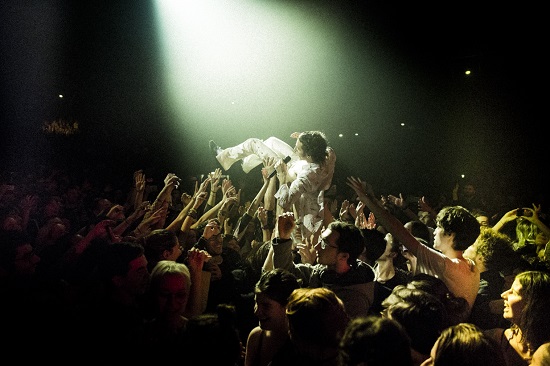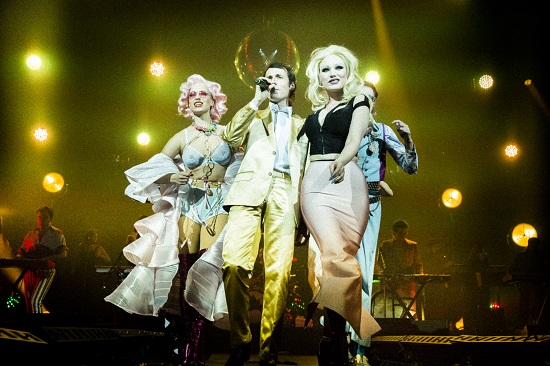All photos courtesy of JF Julian
"We always have been, we are, and I hope that we always shall be detested in France," said the Duke of Wellington. Having put around 40,000 Frenchmen to the sword at the Battle of Waterloo, it was no real surprise il était pas le bienvenu. Thankfully we forever banished the pain of the 100 Year War, the American Revolutionary War, Agincourt, Hastings etcetera with the Entente Cordiale, and life has been a rose ever since. Well, until Brexit happened anyway.
The newfound cooperation between countries that came from the treaty in 1904 didn’t stop us Anglo Saxons eyeing what goes on across the channel with suspicion (and when I say "us" I talk generally in the knowledge that we as a collective have never been more divided). This unhealthy distrust has clearly manifested itself politically of late, but it’s always been more about our divergent cultures than anything else. Plus ça change, plus c’est la même chose. We comfort ourselves with the certainty that we do comedy better (oh, we’re so funny), and roast dinners (the French don’t know what they are), and disability sports (they still use the word "handicapé" for god’s sake). And rock music too of course.
Great Britain is one of three or four net exporters of music globally, so it stands to reason that the country that birthed the Beatles would swagger with a sense of noblesse oblige. And yet there’s a cognitive dissonance that’s a product of our post-imperial narcissism: on one hand we dismiss all other pop markets – with the exception of the US, Canada and maybe Sweden – as rubbish; on the other, we harbour a suspicion that whatever it is the French are up to is probably sassier, sexier, smarter and more highbrow than anything we could produce.
Thankfully their refusal to do any of it in our language rather precludes us from knowing for sure – and why would we need to make the extra effort when our pop game is so strong? The French milieu is welcome when artists see sense and perform their songs in the pop lingua franca. It’s doubtful a duo like Daft Punk would be anything like as popular had they chosen to record in any language but English. We’re happy to share in their shibboleths provided they play by our rules.

When I met Stromae in Amsterdam in 2014 for this publication, he talked about his “conviction" that he could tap into the English market while continuing to sing in his native tongue. The Netherlands, like the rest of Europe, had been unable to resist his charms, and given that pound for pound he’s the best pop star in the world (in my humble opinion), it’s easy to see why. "For me Amsterdam represents proof that people can dance to non-English music even if they don’t understand the lyrics," he told me. "Sometimes people say, ‘You’re crazy because you want to sing in French in Bolivia, in England, in the US, in Japan’, but I don’t think I’m the first one who’s tried it, and it’s possible because we’re not really talking about languages. We’re talking about feelings and emotion. That’s all."
Despite Stromae’s conviction, he remains a peripheral figure in the UK. The Belgian’s biggest hit – ‘Alors On Danse’ – went to no.1 all over Europe and was such a massive earworm that the then French President Nicolas Sarkozy expressed his liking for the track, though it could only scrape into the top 30 in Britain. Stromae’s chef d’oeuvre Racine Carrée from 2013, sold over 2 million records in France – the first album in a decade to do so – and a good million elsewhere, including countries outside of the francosphere. On top of that he’s collaborated with Kanye West and Lorde, who are both huge fans, and he became the first French speaking act to sell out Madison Square Garden in New York, and yet the Brits remain obstinately unimpressed. What does he have to do to break through?
Last year, Christine and the Queens lead the way, taking the unusual step of releasing an album entirely in English that its creator had originally recorded in French (and some English), specifically with the aim of cracking the UK market. To suggest it was successful would be dealing in understatement: Chaleur Humaine went on to become the best selling debut album of 2016 in the United Kingdom. While the UK has a robust music industry, the all-singing, all-dancing Héloïse Letissier’s arrival brought some much needed pizzazz to a pop landscape that currently clamours for the new Ed Sheeran record. Would she have had anything like that success with the French/English original version? I interviewed Héloïse for a travel magazine with a French connection back in 2014 when the first version of the album was just coming out. I tried to pitch something more in depth for many of the UK publications I write for, but the idea was met with either silence or indifference.

Which brings us to La Femme, another French act who have plenty of pizzazz. As ultra chic krautrock-influenced pop acts go, there’s nobody better (though they may be leaders in a field of one). A full to bursting Zenith must surely be their largest headline show yet, and the between song rapture within the auditorium translates as genuine excitement to this old hack. The summer saw La Femme scale down to a manageable six-piece with few gimmicks for the festival circuit, perhaps to prove they could blow audiences away when getting it down to the nitty-gritty. They must have surpassed even their own expectations. Tonight it’s the full technicolor liaison dangereuse, proving they’re a band for all seasons.
La Femme hail from Biarritz in the south west of France, forming in 2010 and moving to Paris soon after. They somehow manage to combine exhibitionism with lyrical existentialism, surf rock with krautrock – the title of their 2013 debut album Psycho Tropical Berlin is indicative of where their hearts lie. As students of the austere and the frivolous, they know when to party and when to partir. They’ve paid their dues in the old fashioned sense, working their way up from your bog-standard boîtes to 6,000 capacity venues with tenacity and certitude, but where paying your dues in the conventional sense equated to earnestness and authenticity in the old days, their shows have become more ostentatious and outright preposterous the bigger the setting.
Indeed, where big British acts – and that’s everyone from, say, Adele to Coldplay, Olly Murs to Jess Glynne – are sold on their ordinariness, French pop right now is reaching out in a bid to be extraordinary. One only has to keep up with David McKenna’s Rockfort column to see the vibrancy and vitality and the musical ambition on offer across the channel. Pop by its very nature is expendable, and it’s of course ever-shifting sands we’re dealing with, but nevertheless at this very juncture, French pop is sassier, it is sexier, it is smarter, and if it’s not more highbrow then it’s certainly a higher class of spectacle.

As I mentioned, the band downsized on tour last year, with only the femme in the shape of chanteuse Clémence Quélennec, but tonight they’re joined by what seems like a cast of thousands, including an opera singer in a black ball gown, backing singers on stage right and three black beret-wearing violinists stage left draping Philly strings over Libezeitian beats. There are samurai-sword wielding vamps in basques, Victorian strongmen and displaced synchronized swimmers, burlesques of indefinable gender… There’s even a turntablist in the shape of DJ Pone from Birdy Nam Nam, who brings an old school flavour to the more hip hop sounding tracks. ‘Exorciseur’ – where Quélennec’s irresistible sprechgesang flow proves she can actually really bloody rap and should do more of it – is especially enjoyable with Pone scratching away at the back.
La Femme are wonderful on record, but their shows are extravaganzas. It’s as though every other minute or so your eye is drawn to a new figure making its way into the light like Orson Welles in The Third Man. One moment you’re watching sailors Russian dancing, the next you’re fixating on a pirouetting bearded queen in a tutu. Mainly though the focus is on Quélennec, and the raffish Sacha Got – dressed like a torero – eliciting genuine screams as he rattles through the insanely catchy ‘Où va le monde’. Quélennec meanwhile has slicked back hair in the pompadour style and a gold lamé jacket, in keeping with the blurring of genres and genders. Everywhere you look there’s vintage clobber and cleavage, leopardskin over bare human skin, lingerie and a fantasmagorica of bijouterie; it’s a big bawdy feast for the eye that shouldn’t quite work – like Noel’s House Party meets Caligula – but somehow it does.

Musically it’s a frenetic experience, and the beats are played harder – and sometimes faster – than they’ve ever been played before, in keeping with the momentous occasion; and by momentous I mean that the shows just keep getting bigger. La Femme will continue to grow in stature, though to succeed in Britain they would need to change. Did I mention, La Femme sing entirely in French? Wait, come back!
Where Christine and the Queens’ lyrics have an abstract quality that may have been easier to translate, La Femme write with a sharpness about situations that would be difficult to convey in English. More to the point, why should they have to change? As our governments retreat into protectionism, now is the time to celebrate our differences, not abhor them. La Femme should keep doing what they do – it’s we that need to change. France has the best pop stars, so we should ignore the ordinary; embrace the extraordinary. On y va!


